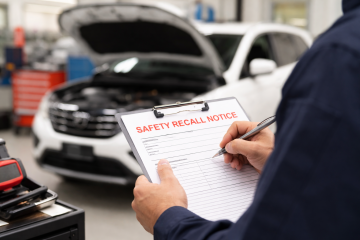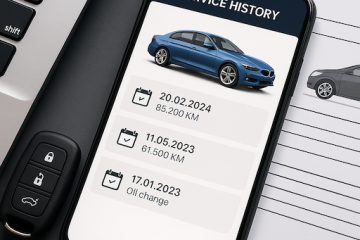Market Insight: Embrace Transparency to Fuel Growth

As a new scandal could be set to rock the automotive industry, One Auto API Commercial Director Rupert Pontin underlines the power of honesty and openness in all aspects of automotive retailing…
As I sit down to write this month’s Market Insight article, who should I be faced with but financial journalist and broadcaster Martin Lewis.
It’s time for his regular Martin Lewis Money Show on ITV and this week’s live episode is a special one hour show dedicated to what the host is referring to as another mis-selling scandal – one which Martin claims has the potential to be second only in impact to the now infamous PPI saga.
It’s a story that’s been cropping up more and more in our client conversations in recent weeks as well as in the media too – one that could potentially have serious repercussions for the motor industry.
So, what’s it all about?
Well, the Financial Conduct Authority (FCA) in the UK has launched an investigation into historical commission agreements in motor finance, specifically focusing on discretionary commissions paid to motor dealers between April 2007 and January 2021.
During this time, these discretionary commission agreements allowed brokers (car dealers) to potentially manipulate rates on car finance, to increase the commission they received and thus perhaps avoid giving customers the best available rates.
Details of the investigation highlight the potential scale of financial misconduct in the sector, with the FCA saying that discretionary commission applied to around 40% of car finance between 2013 and 2016.
With this volume of transactions, the investigation could have far-reaching implications for financial institutions, which could lead to large compensation payouts – some reports are suggesting lenders could face a £10bn compensation bill for unfair car finance deals.
With the scale of the investigation, the cost of handling complaints and subsequent payouts to car buyers, this may ultimately affect the availability and terms of credit for future car purchases.
At a time when many are looking for ways to redress the balance between private and fleet sales, that would be real cause for concern given that in recent years 80% to 90% of new cars (and an increasing number of used vehicles) have been bought with finance agreements.
A question of trust
While the advice on the show was to complain to lenders rather than dealers, this mis-selling situation could possibly stoke the flames of a broader narrative of mistrust among car buyers.
It’s reminiscent of the ‘rip-off Britain’ new car prices scandal of the early noughties and further emphasises the need for complete honesty and openness in all aspects of car retailing.
After all, modern car buyers are more savvy and well-informed than ever.
With access to a wealth of information online, customers can easily compare models, specifications, prices and reviews from different retailers.
So, transparency in all areas of automotive retail business operations is now not just best practice, it’s an imperative for future success and can lay the foundations for long-term prosperity.
This means dealers need to be upfront about things like customer product suitability, vehicle history, and also true powertrain and battery performance for example.
A transparent approach like this not only builds customer loyalty but also ensures compliance with Consumer Rights legislation and wards off the possibility of future legal issues that might arise from withholding information.
Technology to the rescue
Without doubt, technology has a pivotal role in facilitating this much-needed transparency.
A professional and effective digital presence that harnesses tools such as online vehicle history checks, digital service records, high quality imagery and virtual car tours allows customers to access comprehensive information about the vehicles they are interested in.
It proves dealers have nothing to hide, builds trust and underlines a commitment to a positive car buying experience for customers.
Our new partnership with ClearWatt has been driven by a desire for more clarity within used EV retailing specifically – opening up access to Used EV Range Estimate data that can boost buyer confidence in the vehicles they are considering and help set realistic expectations so as to reduce issues post-purchase.
By integrating innovative solutions and data sources like these into their operations, dealers can provide a level of openness that consistently exceeds customer expectations.
Successful technological progression is no longer about standalone monolithic systems. It’s about investing in solutions and services that work seamlessly with each other.
If you develop your tech stack in this way, you can build faster, scale quicker and improve your speed-to-market to give your customers exactly what they need.
By going the extra mile for them, your satisfied buyers are more likely to make repeat purchases and provide positive reviews and referrals – giving you a competitive edge that can fuel consistent growth.
Data informed decision making
Making an effective digital transition is also about having access to good quality, accurate data WITHIN your business too.
Take used car operations, for example.
You can only be truly open and transparent with your customers if you have done the due diligence yourself – undertaking valuation, pricing and history checks to gain the best understanding about the vehicles you’ve been sourcing and adding to your own portfolio.
This data informed approach brings clarity to decision making, streamlines processes, transforms profitability and helps you build a glowing reputation.
A reputation that will ensure you can stand tall when honour is called into question and helps you keep the faith during periods of uncertainty.
In a marketplace where trust is the currency, transparency is everything.
Here to help
If you have any questions about how you can use data to modernise your business processes and support a more transparent approach, click here to schedule a free 30-minute consultation with the One Auto API team. We will use the time to understand your business, project and goals to determine whether we can add value.


